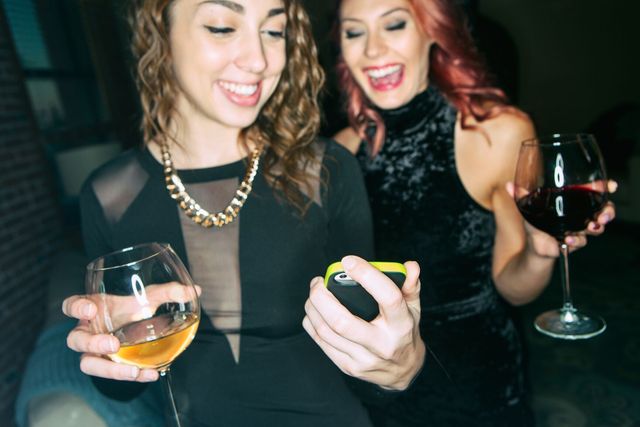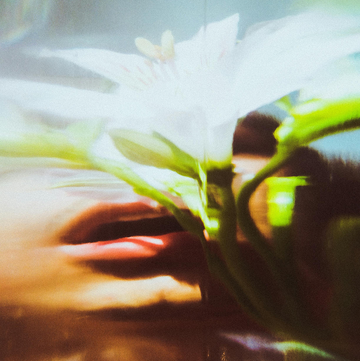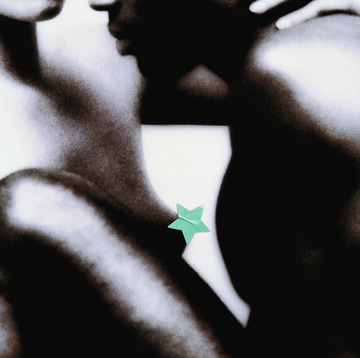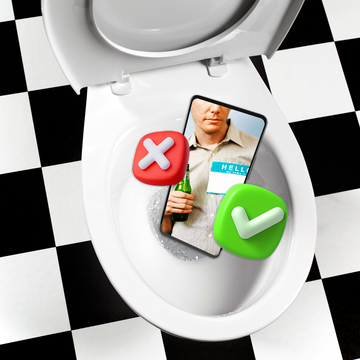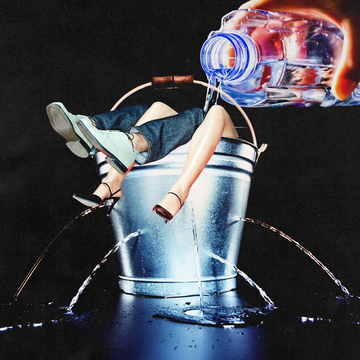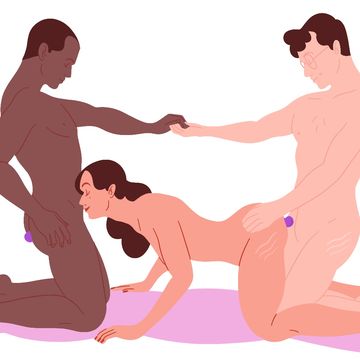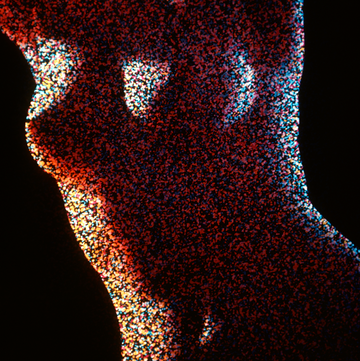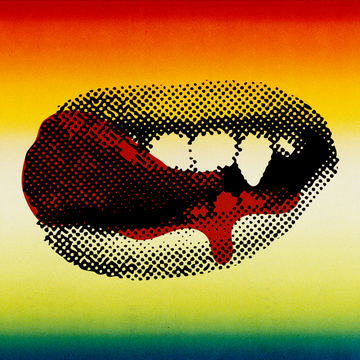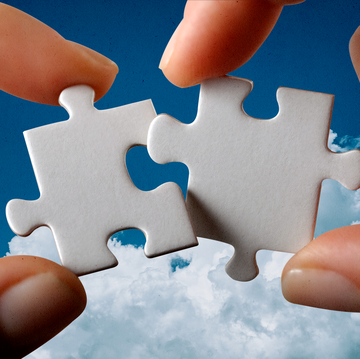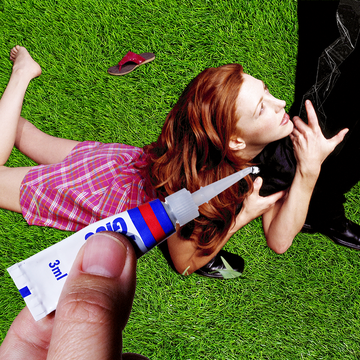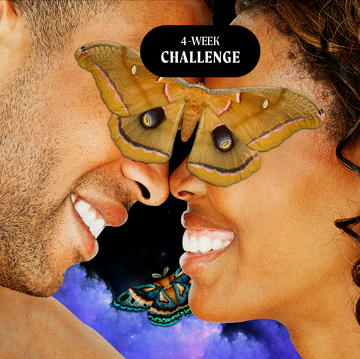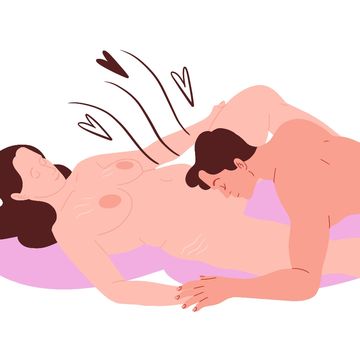We were at a burlesque show chatting about outfits and relationships when my Tinder date remarked, “When you’re femme, you have to come out every day.”
And she's right.
A simple of definition of "femme" is a queer person who presents in a feminine manner, but being femme is different than being feminine. For instance, I’m bisexual, and I also enjoy dresses, manicures, makeup, and other traditionally feminine aesthetics. (You shouldn't describe yourself as femme if you’re straight, though, as you’d be misappropriating the term and contributing to femme erasure by ignoring the inherent queerness of this identity.) Femmes are often mistaken for straight people — and we don’t like it. It’s downright exhausting to have to constantly deal with confused straight men while out on dates with women or non-binary folks, or have a girlfriend consistently be mistaken for a “girl friend” in the Sex and the City sense of the word.
I came out as queer and bisexual (meaning I’m attracted to all genders) when I was 22 shortly after moving to New York. Most of the other women I date are femmes as well. As a result, when I’m on a date with another femme person, straight men often hit on us. This has happened with literally every woman I have dated. Usually, they first approach and offer to buy us drinks. We decline and are often forced to explain that we’re together and not interested. Then rather than respectfully leaving us alone, our personal life becomes all about their boner as they fetishize our orientation. Depending on their level of intoxication, some might even ask, “Can I join?”
These questions remind me that many of them see me as their play thing, reduced to a vessel to fulfill their desires. They assume since I look like a straight girl, I’d ditch my date for them. Such comments act as a reminder of daily assumptions that are made about me and my identity based on the fact that I enjoy makeup, eyelash extensions, high heels and dresses. But I am the authority on my orientation — not a drunk dude up in the club. It does not feel good to have your orientation erased.
It goes beyond bars, too. I’ve noticed that when I post a photo on Instagram of a dude everyone assumes we’re dating, even if it’s just a friend. And if I post a photo of a woman I’m romantically involved with, everyone assumes we’re only friends. Sure, coming out isn’t as big of a deal to me now at 29 as it was when I was 22, but it can still be uncomfortable, especially if you’re forced into it based on someone else’s comments — IRL or on Instagram. Coming out is an individual choice, and queer people should have agency over who they come out to, and when. It shouldn’t be the result of being put into a corner where you feel the need to explain the nature of your relationship based on prying questions and assumptions. It’s exhausting and violating.
Unfortunately, it’s not just straight dudes who are known to interrupt femme for femme dates. Women do it too. Jacqueline Francis is a stripper, writer, illustrator, and comedian known by her moniker Jacq the Stripper. “My wife and I were at this party, and this girl just kept being like, ‘I just want to make out with you,’ Francis says. “We were like, ‘Would you do this to a straight couple?’” Not only is that offensive, it's harassment. It’s exciting to be curious about exploring your sexuality, but queer couples are not there for straight people’s sexual consumption. It’s just another instance in which femmes are forced to correct and inform people about their orientation and desires, which should not have to be your job every time you go out on a date.
There can be privilege in appearing straight, though. When I’m out on dates with other femmes, while we sometimes face harassment from straight people in bars, we are also often unbothered, especially in places without alcohol present like at the movies, since people assume we’re just friends. As a bisexual and queer person, when I’m out on dates with cis men, everyone also assumes I’m straight and leaves me alone. This can make me less likely to be stared at, called slurs, or become the victim of a hate crime, which is a privilege. This makes me aware of my privilege and the importance of educating myself in the experiences of other LGBTQ people, but it doesn’t make me less tired of apologizing for who I am.
While LGBTQ spaces can offer sanctuaries from such experiences, femmes often experience discomfort in queer spaces as well because they are mistaken for heterosexual people imposing or deemed “not gay enough.” I have one hundred percent been mistaken for a straight chick while at Pride Parade with a woman whose genitals I have one hundred percent gone down on. I used to have intense insecurities while in queer spaces that I would be deemed unworthy because I’m femme and bisexual. But it’s not just femmes who date other femmes who experience this. Kenna Cook is a femme pansexual (meaning she date all genders) sex educator from Sacramento, California who says she has 30 years of experience of being mistaken for straight. Her most recent experience of hostility within a queer space was when she and her trans boyfriend were told, “You don’t belong here” at Dyke March in San Francisco this year because they passed as a hetero couple. “We ended up getting a small trans flag to wave as an outward signifier; I even suggested that he take his shirt off so people could see his top surgery scars,” Cook says. This experience, the need to prove himself simply to avoid harassment, brought back a flood of triggering memories of constantly having to prove their queerness for both of them.
These small interactions have long term effects with how femmes and trans people alike can relate and struggle with the queer community. “Sometimes there’s a policing on privilege in queer spaces,” says LGBTQ-friendly New York City-based sex therapist Kelly Wise, Ph.D., who is trans. While many femmes accept incorrect assumptions about their identity as a facet of life in straight spaces, it can feel especially shitty when it happens in LGBTQ spaces, as gay bars and events such as Pride are meant to make queer people feel at home. “I have a lot of clients who shy away from the community because they feel more scared than welcomed,” Wise adds.
It takes experience and becoming comfortable in your own skin for femme people to stop giving a shit what people think of their presence, be it at a Pride event or in a sports bar, Wise explains. And honestly, it’s only recently that I’ve decided people can take me or leave me, and stopped stressing about pleasing others with my orientation or the way I present. This is advice that everyone can benefit from, as social anxiety and insecurity are certainly not exclusive to the femme or queer experience.
Everyone, at some point, has likely experienced discomfort for simply trying to be who they are. In a perfect world, men who perhaps were bullied for being too skinny or into Dungeons or Dragons in middle school would use such memories to be kinder as a drunk adult to two femme women out on a date. While we’ve all felt uncomfortable for those within the LGBTQ community — which despite progress, is still stigmatized —comments such as “but you look straight” can be especially harmful. Not only are they are annoying and can ruin a date, but they can regurgitate feelings of invalidation from which all queer people should be allowed to be free.
Follow Sophie on Twitter.
